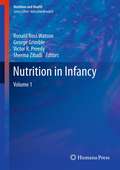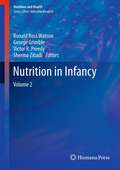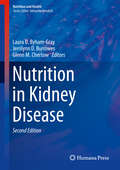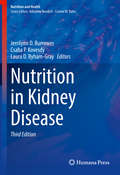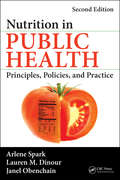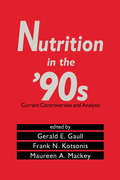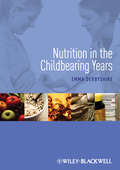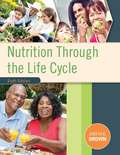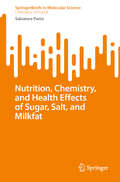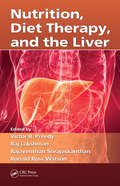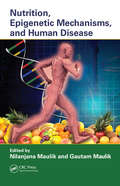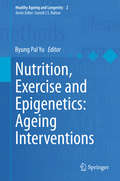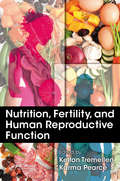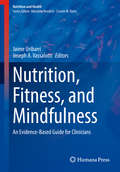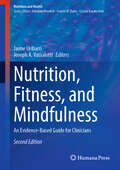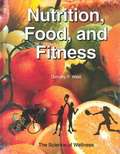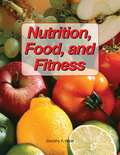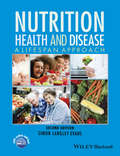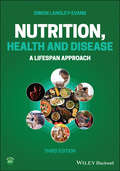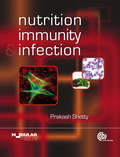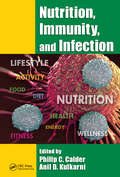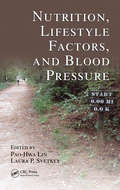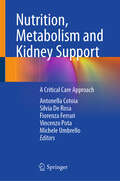- Table View
- List View
Nutrition in Infancy: Volume 1
by Victor R. Preedy Ronald Ross Watson Sherma Zibadi George GrimbleNutrition in Infancy: Volume 1 is a very useful resource for all clinicians treating and preventing nutritional problems in infants. This volume covers a wide range of topics that support wellness in infants through the prevention and treatment of infectious diseases, malnutrition, and developmental and genetic abnormalities. A variety of chapters deal with nutrients for infants with disabilities, surgery, and other special needs. <P><P> Special emphasis is provided for clinicians treating the millions of children in developing countries whose death is promoted by undernutrition or malnutrition. The next sections discuss the health benefits of supplementation and breast feeding and methods to improve use of berast feeding and it's duration. In Nutrition in Infancy: Volume 1, all of these facets of nutrition and nutritional therapy are covered in a precise and practical way. The latest developments in diagnostic procedures and nutritional support are also included. Written by a group of international experts, this volume is an indispensable new reference for clinicians with an interest in the nutrition and health of pregnant mothers and their infants.
Nutrition in Infancy: Volume 2
by Victor R. Preedy Ronald Ross Watson Sherma Zibadi George GrimbleNutrition in Infancy: Volume 2 is a very useful resource for all clinicians treating and preventing nutritional problems in infants. This volume covers a wide range of topics that support wellness in infants through the prevention and treatment of infectious diseases, malnutrition, and developmental and genetic abnormalities. A variety of chapters deal with nutrients for infants with disabilities, surgery, and other special needs.<P><P> The sections in this volume discuss GI Tract Considerations, Formulas, probiotics, hormones and lipids in the health and disease of infants, and the growth and development of infants. In Nutrition in Infancy: Volume 2, a wide range of nutritional and food related therapies to prevent or ameliorate disease, growth retardation and promote health are outlined. The latest developments in diagnostic procedures and nutritional support are also included. Written by a group of international experts, this volume is an indispensable new reference for clinicians with an interest in the nutrition and health of pregnant mothers and their infants.
Nutrition in Kidney Disease
by Laura D. Byham-Gray Jerrilynn D. Burrowes Glenn M. ChertowNutrition in Kidney Disease, Second Edition addresses the relationships between nutrition and (1) normal kidney function and disease, (2) the progressiveness of chronic kidney disease (CKD) and strategies to prevent further compromise, and (3) the treatment and management of kidney failure especially during medical crises, such as acute kidney injury and its consequent nutritional therapies (e. g. , enteral and parenteral nutrition). Demographic patterns, trends and outcomes in the current health care systems are explored in the United States and abroad. Disease prevention and management are presented over the entire lifespan, beginning with pregnancy, followed by infancy, childhood, adolescence, and adulthood, concluding with the elder years. Foundations for clinical practice are established by devoting a complete section towards conducting a comprehensive nutritional assessment, comprising of anthropometric, biochemical, clinical, physical parameters and psychosocial concerns unique to the kidney disease population. Nutritional therapy is also discussed across the spectrum of kidney disease, and pertinent aspects critical to successful management of disorders and conditions, such as bone disease, obesity, and nephrotic syndrome are explored. Nutrition in Kidney Disease, Second edition highlights cutting edge research in regards to exercise and functional outcomes, malnutrition and the inflammatory response, experimental therapies, and the use of complementary and alternative medicine, with a special emphasis on relevant preventative strategies.
Nutrition in Kidney Disease (Nutrition and Health)
by Laura D. Byham-Gray Jerrilynn D. Burrowes Csaba P. KovesdyThis third edition of this text is organized into seven sections that address the educational needs of dietitians around the world who seek current information about nutritional management of chronic kidney disease (CKD). Part I addresses the differences in the epidemiology of CKD and renal replacement therapy worldwide, such as environmental, ethnic, cultural, political and macroeconomic factors. Part II includes a thorough review of the components of the nutrition assessment, which includes information about psychosocial issues affecting nutritional status in kidney disease and drug-nutrient interactions, and parts III and IV review preventative strategies for common disorders associated with CKD such as hypertension, type 2 diabetes, obesity and cardiovascular disease are provided, and current evidence-based treatment recommendations for the nutrition management of non-dialyzed, dialyzed and transplanted adults are addressed. Part V presents the nutritional concerns of CKD populations with special needs (i.e., pregnancy, infancy, childhood, adolescence and the elderly). The nutrition management of other disorders associated with kidney disease are covered in Part VI; these include protein-energy wasting and the inflammatory response, bone and mineral disorders, nephrotic syndrome, nephrolithiasis, and acute kidney injury. Lastly, Part VII is devoted to cutting-edge research on topics of concern in nutrition in kidney disease such as the gut microbiome including pre- and probiotics, appetite regulation, advanced glycation end products, physical activity and structured exercise, and dietary patterns including plant-based diets. When appropriate, the new clinical practice guidelines in nutrition for individuals with CKD are integrated into the chapters. The third edition of Nutrition in Kidney Disease will be a highly informative resource for nephrologists, nutrition scientists, nutritionists, and researchers and students whose research, practice, and education includes nutrition and kidney disease.
Nutrition in Lifestyle Medicine
by James M. RippeThis newest addition to the Nutrition and Health series focuses on nutrition's key role in lifestyle interventions to prevent and manage diseases. The book pays particular attention to nutritional considerations related to obesity, diabetes, and cardiovascular disease. Edited by cardiologist, Dr. James Rippe, a well-known expert in the nascent specialty of Lifestyle Medicine, Nutrition in Lifestyle Medicine will also focus on a variety of specialized areas such as nutrition for athletes and physically active individuals, hydration, and nutrition throughout the life cycle (spanning from children to individuals over the age of 60). In addition, chapters will be included on controversies in nutrition, such as health effects of added sugars and saturated fatty acids in the diet. Finally, specialized chapters will be included in such areas as nutrition for women, nutrition for men, nutrition for latinos, the use of supplements, communication about nutrition, public policy issues, and the interface between nutrition and physical activity. Lifestyle Medicine, supported by the American Journal of Lifestyle Medicine, Dr. Rippe's textbook Lifestyle Medicine (CRC Press, 2013) and American College of Lifestyle Medicine (ACLM), is a new national medicine specialty that stresses the use of lifestyle interventions in the treatment and management of disease. Its practitioners effectively manage medical treatments alongside the lifestyle interventions, for example lowering insulin treatment for patients with diabetes, reducing the dose of anti-hypertension medications for people with hypertension, and prescribing certain medical interventions that aid in smoking cessation.
Nutrition in Public Health: Principles, Policies, and Practice, Second Edition
by Arlene Spark Lauren M. Dinour Janel ObenchainThis second edition of a bestseller, Nutrition in Public Health: Principles, Policies, and Practice focuses on the role of the federal government in determining nutrition policy and influencing practice. Beginning with an overview of public health principles, the book examines the application of nutritional policy to dietary guidance, health promot
Nutrition in the '90s: Current Controversies and Analysis
by Gerald E. Gaull Frank N. Kotsonis Maureen A. MackeyIn ten essays commissioned by the NutraSweet Company, contributors from the health and food sciences explain to the general consumer that nutrition is not as simple as some people make it out to be, and there are still questions about sugar, cholesterol, obesity, and other topics. Annotation copyrig
Nutrition in the Childbearing Years
by Emma DerbyshireIn a field saturated with complex and conflicting information, this exciting new book covers information about nutrition before, during and after pregnancy in a clear and user friendly style. The author addresses all the major aspects of the subject, moving from fertility and preparing the body for pregnancy, through to nutrient metabolism, diet and pregnancy outcome, weight gain, special needs, and postpartum changes and nutrition. This guide's evidence based approach will appeal to nutritionists and dietitians, and to many other health professionals who work with women in their childbearing years, including midwives, nurses and family practioners. Each chapter includes a useful set of appendices covering dietary requirements, nutritional composition of key foods and weight gain guidelines, as well as application in practice sections and a summary of key points.
Nutrition through the Life Cycle
by Judith BrownUnderstand how diet impacts your health with NUTRITION THROUGH THE LIFE CYCLE, Sixth Edition! Based on the latest research available, this text explores the many ways nutrition impacts your growth, development, and normal functioning as you progress through each stage of life, along with some common ailments that can result from nutritional deficits. Packed with current research and resources to help you build your knowledge base, the text alternates between "normal" nutrition and clinical applications, to address each life stage completely. NUTRITION THROUGH THE LIFE CYCLE, Sixth Edition also shares insights of expert authors -- from registered dietitians and other clinical professionals to teachers and researchers -- to help you grasp major concepts and see the truly critical role of nutrition in human health today.
Nutrition, Chemistry, and Health Effects of Sugar, Salt, and Milkfat (SpringerBriefs in Molecular Science)
by Salvatore ParisiThis book covers sugar, salt and milk fat from a chemical perspective, and presents an overview of the role of these ingredients in our food, focusing on their flavors, satiety-inducing properties, nutritional impact, and health effects. The book begins with a chapter devoted to the chemical composition of these taste enhancers and satiety-inducing components, followed by a chapter that sheds light on the persuasive tactics employed by the food industry and their impact on consumer behavior, ultimately discussing the complex relationship between marketing strategies and public health. In Chapter 3, the author presents case studies and explores the nutritional requirements of these ingredients, while considering their physiological effects ad potential implications for human health. In Chapter 4, the author evaluates current consumption patterns and their implications, analyzing trends, policies, and opportunities to shape healthier dietary choices. The book closes with a chapter devoted to the effects of glucose, sodium and cholesterol deficiency, where the author discusses the consequences of imbalanced intake or deficiencies in these ingredients and outlines their impact on human health as well as evidence-based recommendations for keeping a balanced diet. Researchers, scholars, and students in the fields of food science, nutrition, chemistry will understand the appeal of this book.
Nutrition, Diet Therapy, and the Liver
by Victor R. Preedy Ronald Ross Watson Rajaventhan Srirajaskanthan Raj LakshmanWell-illustrated throughout and with in-depth analyses, Nutrition, Diet Therapy, and the Liver provides a holistic understanding of the causative elements that precipitate liver disease and the nutritional factors and regimens that reverse deteriorating hepatic function. This up-to-date resource also incorporates emerging fields of science and sign
Nutrition, Epigenetic Mechanisms, and Human Disease
by Nilanjana Maulik Gautam MaulikAs nutrition research is shifting its focus from epidemiology and physiology to effects of nutrients at the molecular level, a uniquely tailored diet that corresponds to the demands of our genetic signature is emerging as an indispensable need. Using high-throughput genomic tools, nutrigenomics unravels the influence of micro- and macronutrients as
Nutrition, Exercise and Epigenetics: Ageing Interventions
by Byung Pal YuThis book focuses on the three most important aspects of ageing research: nutrition, physical exercise and epigenetics. The contributors discuss ways that age-related epigenetic imprints such as DNA methylation and histone acetylation are modified by these two interventions. The emphasis on epigenetics helps to illuminate the underlying mechanisms of anti-ageing interventions, as ageing and disease are predominately epigenetic phenomena. Among the highlights are chapter-length discussion of such topics as: how anti-inflammatory action of calorie restriction underlies the retardation of ageing and age-related diseases (Chapter 3); epigenetic modification of gene expression by exercise (Chapter 5); the role of functional foods and their bioactive components in bone health (Chapter 8); and an account of the first decade of a study of calorie restriction in nonhuman primates, conducted by the National Institute on Ageing.
Nutrition, Fertility, and Human Reproductive Function
by Kelton Tremellen Karma PearceOne in six couples around the world experience infertility. Before undertaking expensive and intrusive assisted reproductive treatment such as in vitro fertilization, many seek advice from their physicians or dietitians on what foods and supplements might enhance their fertility. But health practitioners are often ill equipped to provide dietary re
Nutrition, Fitness, and Mindfulness: An Evidence-Based Guide for Clinicians (Nutrition and Health)
by Jaime Uribarri Joseph A. VassalottiThis comprehensive volume presents an approach based on cutting edge clinical science to the integration of healthy behaviors in clinical practice, using three major categories; healthy eating, active living, and mindfulness. Chapters are authored and edited by a select group of national and international experts in their respective fields who have developed these concepts for application in routine practice. All chapters are formatted to provide key learning points and summarized conclusions for easy reference. Topics include the DASH diet, plant based nutrition, the Mediterranean diet, beneficial herbs and spices, fitness, spirituality, meditation, healthy sleep, and disease prevention. Nutrition, Fitness, and Mindfulness will be a useful guide for all clinicians and healthcare professionals encouraging patients to make more thoughtful and healthy lifestyle choices.
Nutrition, Fitness, and Mindfulness: An Evidence-Based Guide for Clinicians (Nutrition and Health)
by Jaime Uribarri Joseph A. VassalottiThis book presents an approach to the integration of healthy behaviors in clinical practice based on cutting edge science. It has been authored and edited by a select group of national and international experts in their respective fields who have developed these concepts for application in routine practice. This second edition of Nutrition, Fitness, and Mindfulness uses three major categories to discuss healthy behavior: healthy eating, active living, and mindfulness. All chapters are formatted to provide key learning points and summarized conclusions for easy reference. Eighteen chapters of the first edition have been updated in this new edition and cover such topics as the DASH diet, plant-based nutrition, the Mediterranean diet, beneficial herbs and spices, fitness, spirituality, meditation, healthy sleep, and disease prevention. 7 new chapters have been added, covering ultra-processed foods, food as medicine, integrating dietary patterns into the cultural preference, multicompartment exercise strategies for improving health in older adults with comorbidities, as well as chapters on evidence-based lifestyle interventions in risk of genitourinary cancer, diabetes, and barriers to a healthy lifestyle. Nutrition, Fitness, and Mindfulness: An Evidence-based Guide for Clinicians is a comprehensive guide aimed at all clinicians and healthcare professionals encouraging patients to make more thoughtful and healthy lifestyle choices.
Nutrition, Food and Fitness: The Science of Wellness
by Dorothy F. WestA high school level text addressing the crucial role nutrition and physical activity play in overall health. Topics covered include weight management, eating disorders, food safety, global hunger, physical fitness, stress management, substance abuse, consumer issues, trends, and careers. Abundant teenager-friendly color photos of good-looking, hip people supplement the text.
Nutrition, Food, and Fitness
by Dorothy F. WestNutrition, Food, and Fitness is the perfect choice for non-laboratory nutrition classes. This text stresses the importance of healthful eating and regular physical activity as permanent lifestyle habits rather than short-term programs. Students will learn they have much control over their state of wellness through the decisions they make. They will also study the significance of caring for their mental and social health as part of the total wellness picture. The text is up-to-date with the latest information on the Dietary Guidelines and MyPyramid. It covers weight management, eating disorders, and global hunger as well as physical fitness, substance abuse, consumer issues, and careers.
Nutrition, Health and Disease
by Simon Langley-EvansBringing together key topics in basic science, clinical nutrition, and public health, Nutrition, Health and Disease is an easy-to-read, student-friendly textbook which clearly demonstrates how the body's demand for nutrients changes throughout life, and thus the variety of ways in which nutrition and diet affect health and disease. The second edition of this successful text includes: Expanded introductory material to ensure a firm grasp of key concepts New content on vegetarian, vegan, kosher and other alternative diets Dieting in adults Gender and nutrition Macro- and micronutrients A range of new diagrams to support visual learners Background on nutritional epidemiology and statistics. Nutrition, Health and Disease: A Lifespan Approach is an ideal resource for the range of material a student or newly-qualified nutrition or dietetics professional needs to know.
Nutrition, Health and Disease: A Lifespan Approach
by Simon Langley-EvansNutrition, Health and Disease Nutrition, Health and Disease In this newly revised third edition of Nutrition, Health and Disease, prominent researcher and Professor of Human Nutrition Simon Langley-Evans delivers an easy-to-read and student-friendly textbook on the changing demands for nutrients made by the body throughout the human lifespan. Thorough introductions to lifespan nutrition, maternal nutrition prior to conception, pregnancy, and the relationship between fetal nutrition and disease later in life Practical discussions of lactation and infant feeding, nutrition during childhood, nutrition during adolescence, and nutrition in the adult years Detailed examination of contemporary evidence of the relationship between diet, body weight, and the major nutrition-related diseases: cancer, heart disease and diabetes Exploration of vegetarian, vegan, and other alternative diets, as well as dieting for weight loss in adults, gender and nutrition, macro- and micronutrients, and a background on nutritional epidemiology Access to an updated student companion website with additional resources Perfect for nutrition and dietetics students, as well as newly qualified nutrition and dietetics professionals, this foundational textbook will also earn a place on the bookshelves of other healthcare students and professionals who seek a one-stop reference on the impact that nutrition has on health and disease.
Nutrition, Immunity and Infection
by Prakash ShettyInfectious diseases are an important cause of malnutrition. Recurrent infections increase the risk of malnutrition while poor nutritional status results in lowered immune status and predisposes to infectious disease thus propagating the vicious cycle of infection and malnutrition. The nutrition-infection-immunity axis is crucial for both developed and developing countries and is now a central feature of many nutrition and infectious disease courses. Bringing together nutrition and immunology, Nutrition, Immunity and Infections covers the topic in an accessible format for all students of nutrition, medicine and public health. Through his work at the London School of Hygiene and Tropical Medicine, the FAO's Food and Nutrition Division and his current post at the University of Southampton, Professor Shetty has built a reputation to match his wealth of experience in the relationship between nutrition and susceptibility to infection.
Nutrition, Immunity and Infections
by Prakash ShettyInfectious diseases are an important cause of malnutrition. Recurrent infections increase the risk of malnutrition while poor nutritional status results in lowered immune status and predisposes to infectious disease thus propagating the vicious cycle of infection and malnutrition. The nutrition-infection-immunity axis is crucial for both developed and developing countries and is now a central feature of many nutrition and infectious disease courses. Bringing together nutrition and immunology, Nutrition, Immunity and Infections covers the topic in an accessible format for all students of nutrition, medicine and public health. Through his work at the London School of Hygiene and Tropical Medicine, the FAO's Food and Nutrition Division and his current post at the University of Southampton, Professor Shetty has built a reputation to match his wealth of experience in the relationship between nutrition and susceptibility to infection.
Nutrition, Immunity, and Infection
by Philip C. Calder Anil D. KulkarniBoth nutrition deficiency and overnutrition can have a significant effect on the risk of infection. Nutrition, Immunity, and Infection focuses on the influence of diet on the immune system and how altering one’s diet helps prevent and treat infections and chronic diseases. This book reviews basic immunology and discusses changes in immune function throughout the life course. It features comprehensive chapters on obesity and the role of immune cells in adipose tissue; undernutrition and malnutrition; infant immune maturation; pre- and probiotics; mechanisms of immune regulation by various vitamins and minerals; nutrition and the aging immune system; nutrition interactions with environmental stress; and immunity in the global health arena. Nutrition, Immunity, and Infection describes the various roles of nutrients and other food constituents on immune function, host defense, and resistance to infection. It describes the impact of infection on nutritional status through a translational approach. Chapters bring together molecular, cellular, and experimental studies alongside human trials so that readers can assess both the evidence for the effects of the food component being discussed and the mechanisms underlying those effects. The impact of specific conditions including obesity, anorexia nervosa, and HIV infection is also considered. Chapter authors are experts in nutrition, immunity, and infection from all around the globe, including Europe, Australia, Brazil, India, and the United States. This book is a valuable resource for nutrition scientists, food scientists, dietitians, health practitioners, and students interested in nutrition and immunity.
Nutrition, Lifestyle Factors, and Blood Pressure
by Pao-Hwa Lin Laura P. SvetkeyEven though enormous advancements have been made in identifying evidence-based lifestyle strategies for hypertension prevention and management, little progress has been made in implementing these proven strategies. Nutrition, Lifestyle Factors, and Blood Pressure compiles practical, science-based information for health care providers to provide eff
Nutrition, Metabolism and Kidney Support: A Critical Care Approach
by Silvia De Rosa Antonella Cotoia Fiorenza Ferrari Vincenzo Pota Michele UmbrelloThis book draws a pathway from metabolic assessment and nutrition support to advances in renal replacement therapy and organ support in critical care, underling the specific clinical aspect and focusing on medical clinical management in critical care. Metabolic alterations in critically ill patients have been studied for many years. Despite everything, the heterogeneity of critically ill patients, the duration and variable severity of the acute phase of the disease and the numerous confounding factors have hindered progress in this field. A cornerstone of metabolic care is nutrition, that is an essential part of the care for critically ill patients, although the optimal feeding strategy for patients in the intensive care unit is still debated and often remains a challenge for the intensive care team in clinical practice. In addition, acute loss of renal function interferes with the metabolism of all macronutrients, responsible for pro-inflammatory, pro-oxidative and hyper-catabolic situations. The physiological and biological modifications related to acute renal failure in critically ill patients, including the current use of continuous renal replacement therapies, have dramatically changed the type and importance of the metabolic and nutrition disturbances observed during treatment of renal failure. This book - addressed to healthcare providers working in intensive care units - aims to provide a comprehensive synthesis and interpretation of the adult critical care nutrition and critical care nephrology literature, with a particular focus on continuing practice gaps and areas with new data, to assist clinicians in making practical, yet evidence-based decisions regarding nutrition management during the different stages of critical illness.
